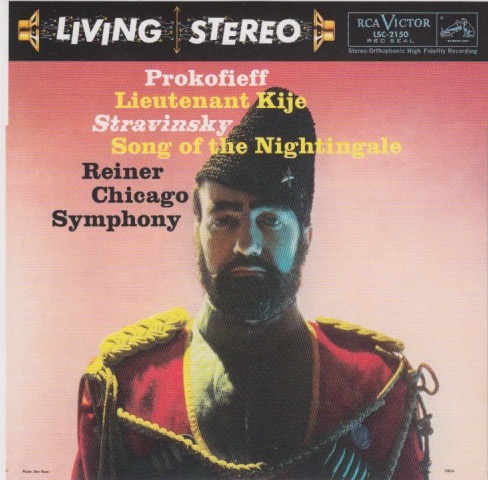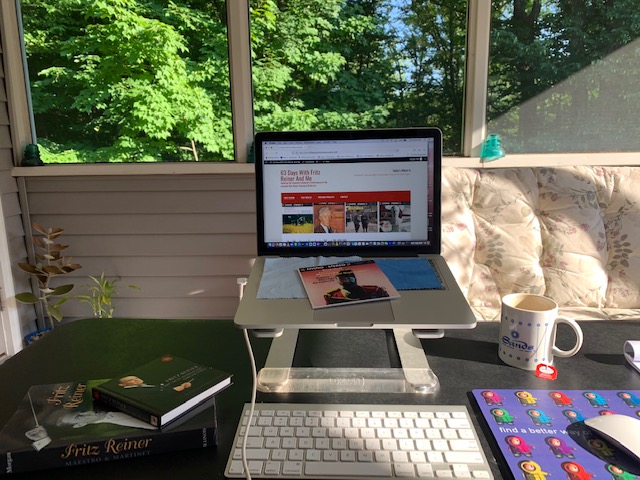
It’s a beautiful morning here in West Michigan. Temperature is a delightful 70 degrees under sunny skies and a relatively low humidity of 77%. By all accounts, it’s perfect.
So, I decided to make the screened-in porch my office this morning. (Who wouldn’t?) My Sands Hotel Casino mug is beside me, as is the unmistakable aroma of Twining’s English Breakfast Tea mixing with the smell of fresh, outdoors air.
Prior to this morning, I had never heard of a composer named Prokofieff. In fact, when I first looked at the name, I read it as Prokofiev, which I later discovered it was. Why it’s listed as Prokofieff on this album is a mystery to me. Probably an Americanized spelling.
As I listened to all five movements of Prokofiev’s Lieutenant Kijé, I stopped short when got to Movement IV. I’d heard it before. Many, many times before.
Movement IV (“Troika”) was used by Greg Lake (1/3 of the Prog Rock trio Emerson Lake & Palmer) in his song, “I Believe In Father Christmas,” which automatically elevated Lake’s perennial Christmas song (although its true meaning is anti-war) to legendary status.
NOTE: As I watched the video below, I started to feel sad that Greg passed away in 2016. I had interviewed him at length by phone back in the mid 1990s, and I had met him in person in London in the late 1990s. In addition, I had seen ELP in concert 3-4 times over the years. Always a stunning show. One of the downsides to doing these musical projects is that I observe so many “dash” dates – you know, 1947-2016 (in the case of Greg Lake). Nearly everybody I listen to – especially the composers – in my projects is no longer with us. So these musical explorations always give me an acute appreciation for (if not outright fear of) the passage of time, not to mention loss.
The Objective Stuff
From his entry on Wikipedia,
Sergei Sergeyevich Prokofiev (1891 – 1953) was a Russian Soviet composer, pianist and conductor. As the creator of acknowledged masterpieces across numerous music genres, he is regarded as one of the major composers of the 20th century. His works include such widely heard pieces as the March from The Love for Three Oranges, the suite Lieutenant Kijé, the ballet Romeo and Juliet—from which “Dance of the Knights” is taken—and Peter and the Wolf. Of the established forms and genres in which he worked, he created – excluding juvenilia – seven completed operas, seven symphonies, eight ballets, five piano concertos, two violin concertos, a cello concerto, a symphony-concerto for cello and orchestra, and nine completed piano sonatas.
From its entry on Wikipedia,
Sergei Prokofiev’s Lieutenant Kijé (Russian: Поручик Киже, Poruchik Kizhe) music was originally written to accompany the film of the same name, produced by the Belgoskino film studios in Leningrad in 1933–34 and released in March 1934. It was Prokofiev’s first attempt at film music, and his first commission.
In the early days of sound cinema, among the various distinguished composers ready to try their hand at film music, Prokofiev was not an obvious choice for the commission. Based in Paris for almost a decade, he had a reputation for experimentation and dissonance, characteristics at odds with the cultural norms of the Soviet Union. By early 1933, however, Prokofiev was anxious to return to his homeland, and saw the film commission as an opportunity to write music in a more popular and accessible style.
After the film’s successful release, the five-movement Kijé suite was first performed in December 1934, and quickly became part of the international concert repertoire. It has remained one of the composer’s best-known and most frequently recorded works. Elements of the suite’s score have been used in several later films, and in two popular songs of the Cold War era.
Prokofiev was 42 or 43 when he composed this music. This performance was recorded on March 2, 1957, in Orchestra Hall, Chicago.
The other piece of music on today’s album is by Stravinsky, Song of the Nightingale.
From his entry on Wikipedia,
Igor Fyodorovich Stravinskyne (1882 – 1971) was a Russian composer, pianist and conductor, later of French (from 1934) and American (from 1945) citizenship. He is widely considered one of the most important and influential composers of the 20th century.
From its entry on Wikipedia,
Le chant du rossignol (English: The Song of the Nightingale) is a symphonic poem written by Igor Stravinsky in 1917. The score is adapted from his earlier work, Le rossignol (The Nightingale), an opera from 1914. The opera, based on Hans Christian Andersen’s 1843 tale “The Nightingale”, is set in three acts, told from the point of view of a Chinese fisherman. In the orchestral version, Stravinsky mostly uses music from acts two and three.
Stravinsky was 35 when he wrote this piece of music. It was recorded on November 3, 1956 in Orchestra Hall, Chicago. Stravinsky was still alive when this was performed by the Chicago Symphony Orchestra. I wonder what he thought of it? It’s possible Kenneth Morgan’s book Fritz Reiner Maestro & Martinet would tell me. But I don’t have an hour to look up all possible references to Stravinsky in the Index. I’ve mentioned it before, but it’s worth mentioning again, the biggest fault I have with Morgan’s book is that it’s not cross referenced in such a way that I can actually use it. For example, I cannot look up a composition (in this case, The Song of the Nightingale) and find its spot within the pages of the book. Barring that, I’d have to look at every reference to Stravinsky, page after page, hoping Morgan mentioned one specific date somewhere within those pages.
Another way to cross reference that would have been helpful is to cross reference by date. In this case, The Song of the Nightingale was recorded on November 3, 1956. If Morgan had thought to index by date, I could have flipped to the pages from that date and looked to see if Stravinsky’s composition was listed there. Alas.
A book without sufficient cross referencing/Index options really irks me.
The Subjective Stuff
Recording quality: 4.5
Overall musicianship: 5
CD booklet notes: 2
CD “album cover” information: 3.5
How does this make me feel: 4.5
I’m not usually a fan of dissonance. My brain is wired to enjoy a more melodious musical fare. And Prokofiev and Stravinsky seem to enjoy a bit of dissonance in their compositions. Or, maybe its the prominent use of brass instruments, which often sound like dissonance to me.
I enjoyed both of these compositions. They were recorded exceptionally well (truly living up to the Living Stereo reputation), and performed with verve.
Plus, they were interesting compositions. They captured my attention and intrigued me.
I’d listen to this album again.

